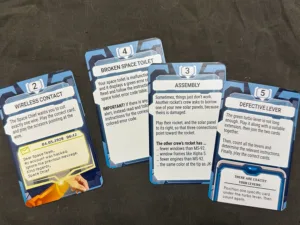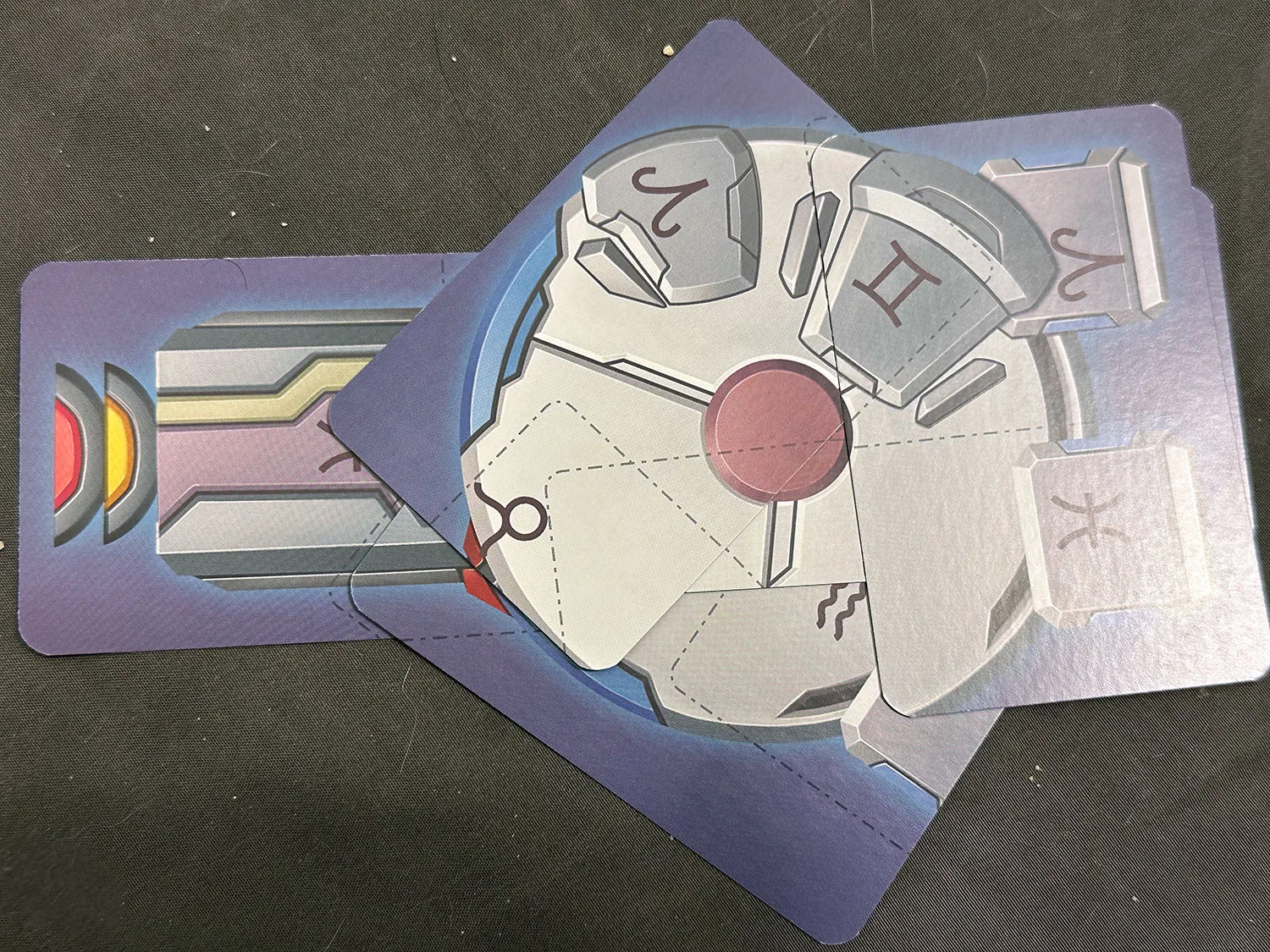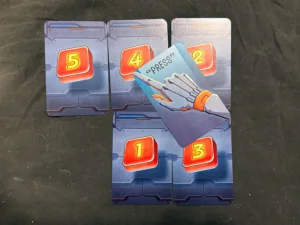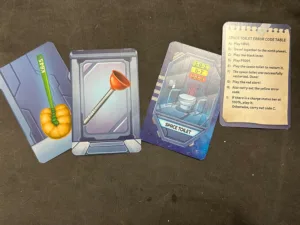 Sometimes, a game sells itself to you just in its name. I was asked “Do you want to review Noobs in Space?” Knowing nothing else about it, I did not even look at the BGG link before saying yes, solely because of the name. Only later did I discover it was a cooperative game, which was really icing on the cake.
Sometimes, a game sells itself to you just in its name. I was asked “Do you want to review Noobs in Space?” Knowing nothing else about it, I did not even look at the BGG link before saying yes, solely because of the name. Only later did I discover it was a cooperative game, which was really icing on the cake.
Noobs in Space is a cooperative game for 3-5 players which can be played in series of 10-15 minute sessions or all at once over about 2 hours. Now, let’s look at PIGS—IN—er, I mean, NOOBS—IN—SPACE!!!
Gameplay Overview:
Thematically, the concept of this game is you are new recruits on a ship where there are many things that go wrong, and you must work together to solve the issues. Not counting the special training exercise, this amounts to 8 separate puzzles to solve in a “complete” game. Each puzzle is unique and separate from the others, so you can do them all in one sitting, or separately over many sessions. Each one can take 10-to-15 minutes, so any approach is ultimately reasonable, depending on your time available.

When setting up for a puzzle, You identify the subset of the game’s 120 cards which show the the number of the puzzle that you are attempting. The rulebook has a chart that tells you how many there should be for each, so you can double check that you have everything (there are around 30 for each puzzle). Many cards end up being used in several puzzles, but in different ways. Each player gets an equal number of cards, and from that moment on you cannot show each other your hands, but you can describe things to each other.
Each puzzle consists of a number of tasks that must be completed in order. These tasks are on cards in players’ hands. They will ask you to do things, like play cards in certain layouts or orders, count the number of types of cards, or say different phrases on the cards (and more). Once you have played a card, you cannot take it back! So you need to correctly deduce the solutions to each task before committing. Time is also of the essence, as you run a stopwatch and are scored at the end of each puzzle in part by your team’s speed. Once you have completed all the tasks, you compare how your played cards look to the solution, penalize your time for every wrong task, and score yourself based on that final number. Then, move on to the next puzzle!

Game Experience:
The rules are simple, so simple that the game teaches them to you without the rulebook. As I mentioned briefly, there is a special training exercise with 6 cards that essentially teaches nearly all the rules of the game, before you even open the rules. It is very effective at getting into the game quickly, getting you everything you need to know so starting the first full puzzle is a breeze. Everyone understands how it all works from the word “go.”

The two main elements that make ithe game interesting are the timer and the communication rules. Knowing that the timer is running gives the game a fast-paced feeling. All of your decisions and discussions take up valuable time. It adds to the thematic feeling of being on a ship where solving the tasks is a time-sensitive issue that could result in you all being blown out into the vacuum of space if you fail. Wait, maybe it doesn’t quite feel that serious! The communication rules do tie into this thematic feeling as well, as you are meant to be new cadets with little-to-no-experience at your jobs on this ship. The need to describe your cards (rather than show them) slows it down, and makes it less simple than it may at first appear.
The puzzles and tasks themselves vary widely. Some cards depict spaceships, some levers, some keypad buttons, some other more unusual items. A task can tell you to play a certain spaceship, and then connect different rooms to it in a specific configuration. You could be asked to reassemble a broken keypad based on certain rules (usually, some sort of math is involved here), and then press a specific button.

You might need to follow the space toilet problem-solving flow chart, and assemble the correct solution. You truly are important engineers on this spaceship. A few of the tasks are the same across different puzzles, but have conditional requirements. For example, a task could tell you to count the number of levers, and then do something different depending on how many there are. Due to the fact that the overall card pool changes for each puzzle, you don’t necessarily do the same thing when you see one of this tasks in a later puzzle becase there could be more or fewer levers in players’ hands!
One particular type of task that I liked was a series of word charts spread throughout players’ hands. One side of the chart indicates a word you hear, and the other, the word that you say when you hear the previous word. The task instructs you to start with a certain word, which results in players saying random words back and forth until you stop at whatever point the task sets (such as, after a certain number of pairs).
Final Thoughts:
This game is very light on both components and rules. It makes for a nice, light game, ideal for someone who might not be into board games in general, or as a filler when you only have a little bit of time. The puzzles on some levels seem basic, but can be challenging because the details matter, and the requirement that you describe your cards rather than show them introduces a margin for error. Some might not like the aspect of the restricted knowledge, but it fits thematically.
One of the cute elements in the rulebook is that between puzzles, when you go to check your score (after you tally at your final time including penalties), there is a story paragraph to read based on that score. Each has a star rating, with faster being a higher rating. As your rating gets lower and lower, the story text gets progressively more condescending of you and your fellow “noobs.” Sometimes, failing and having a really bad time can be more amusing than succeeding without an issue!
As someone who likes cooperative games and is always looking for a new one to get people into, this was a welcome find for me. Given its low cost and small size (as well as quick play time per puzzle), I find Noobs in Space to be a pretty solid entry into the genre. It has the difficulty that you hope for from a cooperative game, but it is simple and approachable with low rules overhead.
Final Score: 3.5 Stars – A solid, low-component cooperative game with a quick play time. Replay value is a bit limited, but is good for a couple of entertaining hours across the 8 puzzles.
 Hits:
Hits:
• Fast-paced, and keeps you engaged for the duration of each puzzle
• Thematic text for succeeding and failing is good, and is worth completing each puzzle.
• The modular nature of the puzzles and short time of each allows it to take as much or as little time as you can afford.
Misses:
• The replay value could be limited, since the puzzles are the same every time (only the card distribution to players changes).
• The communication restriction can at times feel frustrating when you can’t show something.





















